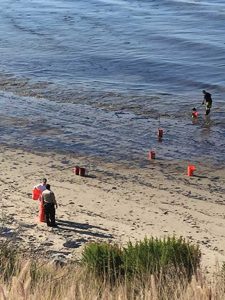
A California Highway Patrol officer warns volunteers who showed up May 20 to clean up oil near Refugio State Beach from a 21,000-gallon pipeline spill to leave the area because it was too hazardous.
Photo by Debra Giles
It’s a case of business as usual for Plains All American Pipeline, which owns the pipe that ruptured near Goleta on May 19 and spilled an estimated 101,000 gallons of oil.
About 21,000 gallons of oil flowed through a storm culvert under Highway 101 into the ocean, blackening area beaches and creating a 10-square-mile oil slick. Refugio and El Capitan beaches are expected to remain closed to the public, as well as area fisheries, until at least June 4 as clean-up efforts continue.
Despite soiling pristine beaches that are key to Santa Barbara County tourism just before the busy Memorial Day weekend, Texas-based Plains currently faces only a $200,000 fine from the federal Pipeline and Hazardous Materials Safety Administration because the actual spill lasted less than a day.
Under the Clean Water Act, Plains could be liable for a maximum of $4,300 per barrel. So based on 2,404 barrels spilled, Plains could be on the hook for another $10.3 million in federal fines.
That might seem like a stiff penalty but it’s a drop in the bucket for a company as big as Plains, which reported $43 billion in revenue in 2014 and $878 million in profit. Plains owns and operates nearly 18,000 miles of pipes in several states.
But Plains has a long history of oil spill violations. Federal records show that Plains has accumulated 175 safety and maintenance infractions since 2006, and its rate of incidents per mile of pipe is more than three times the national average. Only four companies out of 1,700 in the federal database maintained by the PHMSA reported more infractions than Plains.
Knowing that there is a good chance its pipes will leak oil somewhere, Plains apparently budgets for oil spills to occur. In its filings with the Securities and Exchange Commission, Plains said on March 31 that it had a $75 million reserve fund for environmental liabilities. That means Plains could afford to pay for several oil spills the size of the one along the Gaviota Coast.
Clearly the company has weighed the price of being fined often for oil spills and factored it into its cost of doing business. The only way to get Plains to be a better operator and corporate citizen is to put more teeth into environmental safety laws by creating heftier fines.
Instead of $200,000 per day and a maximum of $2 million per incident, perhaps the PHMSA should levy fines of $2 million per day or even $20 million per day. Instead of a maximum liability of $4,300 per barrel under the Clean Water Act, how about $100,000 per barrel or $1 million per barrel? The other alternative is criminal liability for individuals, including executives, in cases of extreme negligence.
The bottom line on oil spills is that only way to keep bad operators from rolling the cost of fines into their annual budgets is to make violations so painful that business as usual cannot be sustained.
Suzanne McNeely was a true leader
The Central Coast business community lost a true leader on May 16 when Suzanne McNeely, founder of Senior Planning Services, passed away after a valiant battle with cancer.
McNeely was a pioneer in providing high-quality senior care at home and the Business Times honored her with a Spirit of Small Business Award in 2009.
Our sincerest condolences to Senior Planning Services and Suzanne’s family. You can honor her memory with a donation to the Leukemia and Lymphoma Society.






 Print
Print Email
Email

















